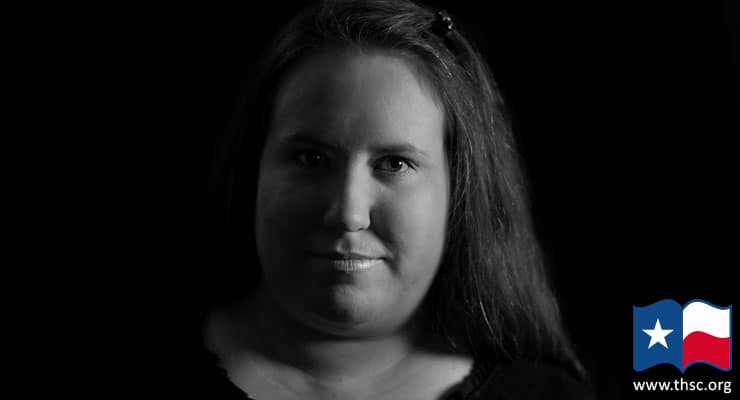
“They came here and just took her … She didn’t get to say goodbye; she didn’t get to see me for months.”
Although this sounds like a kidnapping, it’s not. Chassidie Russell’s daughter was taken by a Texas Family Court Judge. She spent three years living with estranged in-laws even though Russell was never accused of being neglectful or abusive.
The Russell family were victims of two commonly misused procedures in Texas Family Court—two of the very things that THSC intends to change during the 2017 legislature.
It Began as an Unbelievable Threat
Russell was a single mother to Caitlyn until she married David Harvey in 2000. They divorced two years later. Even though Harvey was not Caitlyn’s biological father, he was granted standard visitation rights. Russell later married Mike Russell.
When Harvey moved to San Diego, he sent a letter to the Russells stating he wanted his parents, Ken and Jan, to take over his visitation rights. Soon, Chassidie’s ex-in-laws hired an attorney and filed a suit claiming they were alienated from Caitlyn, causing her emotional harm. They threatened to take Caitlyn to California.
How the Court Took Caitlyn Away for Three Years
The Russells are a prime example of how the courts abused two procedures which tear apart healthy families. In 2 steps, the case became a nightmare:
- In 2007, a judge in Fort Worth issued a temporary order, granting Ken and Jan full “temporary” possession of Caitlyn. Temporary orders are orders issued by a judge that have no statutory expiration date and cannot be appealed through the regular process.
- Secondly, the temporary order that was issued was issued “in the best interest of the child.” A judge who issues a temporary order for the unjust removal of a child in a custody or possession dispute can easily shield himself or herself from the legal consequences by stating that the decision was made in “the child’s best interests.” What seems to be overlooked is that, unless proven unfit, staying with the child’s parent is in the child’s best interests.
How the Story Ends
The Russells drained their personal finances, incurred massive debt, and took out personal loans in order for them to overturn the ruling of the Fort Worth judge. They took the case all the way to the Texas Supreme Court, where Ken and Jan were finally denied access to Caitlyn and she was able to come home after three long years.
How THSC Can Help Prevent These Kinds of Unjust Removals
Passing parental rights reform legislation is one of THSC’s main legislative priorities for the 2017 legislative session. This legislation would ensure that courts can’t issue temporary orders for the removal of children from fit parents and then claim that it’s in the best interest of the child. Protecting the rights of fit parents is a fundamental part of how THSC is Keeping Texas Families Free.
Two Ways You Can Help
- Please share this post so that we can raise awareness of these issues as we work on passing bills to fix them.
- Support THSC today with a generous financial donation so that we can continue to help upstanding families like the Russells.

“They came here and just took her … She didn’t get to say goodbye; she didn’t get to see me for months.”
Although this sounds like a kidnapping, it’s not. Chassidie Russell’s daughter was taken by a Texas Family Court Judge. She spent three years living with estranged in-laws even though Russell was never accused of being neglectful or abusive.
The Russell family were victims of two commonly misused procedures in Texas Family Court—two of the very things that THSC intends to change during the 2017 legislature.
It Began as an Unbelievable Threat
Russell was a single mother to Caitlyn until she married David Harvey in 2000. They divorced two years later. Even though Harvey was not Caitlyn’s biological father, he was granted standard visitation rights. Russell later married Mike Russell.
When Harvey moved to San Diego, he sent a letter to the Russells stating he wanted his parents, Ken and Jan, to take over his visitation rights. Soon, Chassidie’s ex-in-laws hired an attorney and filed a suit claiming they were alienated from Caitlyn, causing her emotional harm. They threatened to take Caitlyn to California.
How the Court Took Caitlyn Away for Three Years
The Russells are a prime example of how the courts abused two procedures which tear apart healthy families. In 2 steps, the case became a nightmare:
- In 2007, a judge in Fort Worth issued a temporary order, granting Ken and Jan full “temporary” possession of Caitlyn. Temporary orders are orders issued by a judge that have no statutory expiration date and cannot be appealed through the regular process.
- Secondly, the temporary order that was issued was issued “in the best interest of the child.” A judge who issues a temporary order for the unjust removal of a child in a custody or possession dispute can easily shield himself or herself from the legal consequences by stating that the decision was made in “the child’s best interests.” What seems to be overlooked is that, unless proven unfit, staying with the child’s parent is in the child’s best interests.
How the Story Ends
The Russells drained their personal finances, incurred massive debt, and took out personal loans in order for them to overturn the ruling of the Fort Worth judge. They took the case all the way to the Texas Supreme Court, where Ken and Jan were finally denied access to Caitlyn and she was able to come home after three long years.
How THSC Can Help Prevent These Kinds of Unjust Removals
Passing parental rights reform legislation is one of THSC’s main legislative priorities for the 2017 legislative session. This legislation would ensure that courts can’t issue temporary orders for the removal of children from fit parents and then claim that it’s in the best interest of the child. Protecting the rights of fit parents is a fundamental part of how THSC is Keeping Texas Families Free.
Two Ways You Can Help
- Please share this post so that we can raise awareness of these issues as we work on passing bills to fix them.
- Support THSC today with a generous financial donation so that we can continue to help upstanding families like the Russells.



